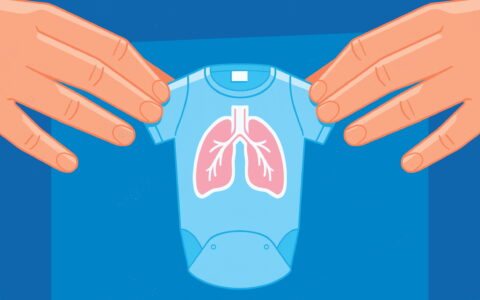Biologics can greatly improve the outlook for children with the most intractable cases of severe asthma, and the drugs need to be considered for incorporation into treatment plans for more such patients, authors of a recent paper in the Journal of Allergy and Clinical Immunology maintain.
“Uncontrolled asthma does not have to be settled-for anymore,” said Leonard B. Bacharier, M.D., a co-author of the research and Janie Robinson and John Moore Lee Chair in Pediatrics at Vanderbilt University Medical Center. “We have precision medicine approaches now that mean we can get the right medications into the right patients. These drugs can reduce the impact of the illness so much that these children can finally enjoy full, active lives.”
Families Find Relief
Families of children with severe asthma come to see emergency department visits and activity limitations as a wearying routine, Bacharier said, adding that all can tell stories of vacations or birthdays ruined by asthma.
“The vast majority of families with a child on these medications will ask us, ‘Why didn’t we do this sooner? Where has this been? Why did we live with so much asthma for so long?’” he said.
Moving Down in Age
Biologics first became available to treat severe asthma in adults about 20 years ago, but research in children and adolescents has lagged, Bacharier said. Biologics today are approved for people with asthma as young as 6 years old.
“We are now studying them in 2- and 3-year-olds, and we’re getting ready to study them in 6-month-olds,” Bacharier said.
For Black and Hispanic children, the need for better handling of severe asthma is especially acute, as these youngsters are disproportionately affected by extreme forms of the illness.
Not One-Size-Fits-All
Biologics merit consideration for children with certain types of severe asthma, a group that comprises between 2 and 10 percent of the pediatric patient population with the disease, the authors wrote.
“We do a series of blood and breathing tests to identify the child’s specific form of asthma,” Bacharier said. “Knowing that, we can determine if the biologics are appropriate for a given child. These are not one-size-fits-all. They are very specifically targeted medicines for the right kinds of patients.”
The new drugs are expensive, around $30,000 per year, but insurers have generally been willing to cover them once the clinical case is made, Bacharier said.
Side Effects Often Mild
Biologics are injectable drugs, and the most common side effects involve soreness at the injection site. Rarely, children experience sore throats or headaches. Some of these drugs also involve a slight risk of anaphylaxis, so patients may need to keep epinephrine handy.
In contrast, the side effects of prednisone, the drug most often used to control severe asthma and asthma flares in children, are onerous and many. Long-term use of the steroid raises a child’s risk of diabetes, cataracts, and osteoporosis among other problems, the researcher explained, adding that it can also induce substantial behavioral side effects.
“Prednisone is the enemy, a medicine loaded with side effects that can accumulate over time. We’d be in bad shape if we didn’t have it at all, but it’s important to use as little of it as possible,” Bacharier said.
Concerns are Legitimate
Because biologics are relatively new to the market, their long-term safety for use in children and adolescents remains unclear.
“So far, the longest study of pediatric use of these drugs followed children for two years, although we intend to use them longer than that,” Bacharier said, of the typical course of administration.
While there are reasons to be careful in prescribing these medications, Bacharier noted, “that doesn’t mean we should be afraid to use them in patients experiencing asthma’s most severe effects.”
Starting Patients Constantly
Once a month, Vanderbilt holds a special clinic to coordinate treatment for the most complicated patients with childhood asthma.
“Not one clinic goes by where we don’t consider starting a child on a biologic.”
“Not one clinic goes by where we don’t consider starting a child on a biologic. If they meet all the criteria and we are confident we have taken all other factors into account, we begin the discussion with the family about biologics, their potential benefits and their risks,” Bacharier said.





